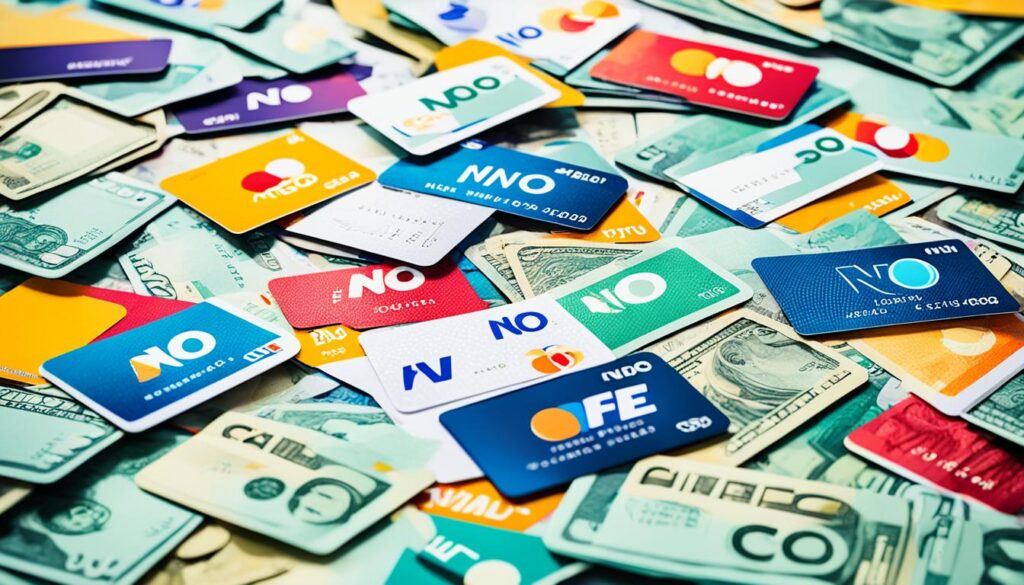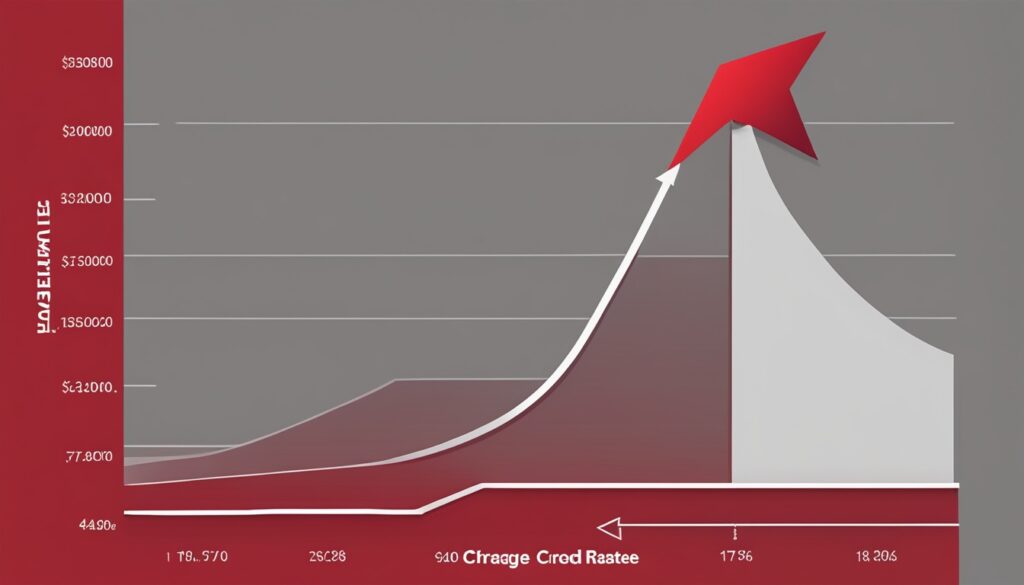Did you know the average credit card late fee is now $32? You can Avoid Credit Card Fees and save more money with the right strategies. This guide will show you how to dodge common credit card fees like annual charges, interest rates, and late fees. You’ll learn how to keep your money in your pocket.
Key Takeaways
- Learn how to choose no-annual-fee credit cards and evaluate the benefits of annual-fee cards.
- Discover tactics to eliminate interest charges by paying your balance in full each month and utilizing 0% APR introductory offers.
- Explore ways to steer clear of late payment fees, such as setting up automatic payments and selecting cards with no late fees.
- Understand how to avoid foreign transaction fees, balance transfer fees, cash advance fees, and over-the-limit fees.
- Develop a strategy to prevent returned payment fees by verifying sufficient funds.
Understanding Common Credit Card Fees
Using a credit card comes with various fees that can affect your costs. It’s key to know the main fees tied to your card to handle your money well. Let’s look at the main credit card fees you should know about.
Annual Fees
Many credit cards have an annual fee just for having the card, even if you don’t use it much. These fees can be as low as $95 or as high as over $500 a year. It depends on the card’s perks and benefits. Knowing what you get from the card can help you decide if the annual fee is good for your spending.
Interest Charges (Finance Charges)
Interest charges, or finance charges, happen when you don’t pay off your balance each month. Credit card interest rates can be from about 15% to as high as 30% APR. To dodge these high costs, try to pay your balance in full every month if you can.
Late Payment Fees
If you don’t make the minimum payment on time, you might face a late payment fee, which could be up to $40. Using automatic payments or reminders can help you avoid these fees and keep your payment history good.
| Fee Type | Typical Range |
|---|---|
| Annual Fees | $95 to over $500 |
| Interest Charges (APR) | 15% to 30% |
| Late Payment Fees | Up to $40 |
Knowing about these common credit card fees helps you make smart choices about which cards to use and how to manage your expenses. Keeping up with your payments and using the card’s benefits can reduce the effect of these fees on your finances.

Avoiding Annual Fees
Choosing a card with no annual fee is an easy way to save money. Many credit card companies offer cards with no fees but still give great rewards and benefits. When looking at these no annual fee credit cards, compare their features and rewards. This helps you see if the lack of a fee is better than any rewards you might miss out on.
Some annual-fee cards offer big rewards like high earning rates, sign-up bonuses, or travel perks. These benefits might make the fee worth it. Think about your spending, travel needs, and what the card offers to decide if it’s a good deal.
Choosing No-Annual-Fee Credit Cards
- Look for cards that waive the annual fee for the first year, allowing you to try out the card before committing to the long-term cost.
- Compare the rewards and benefits offered by no-annual-fee cards to ensure you’re not sacrificing too much by avoiding the fee.
- Consider cards that offer valuable perks like cash back, points, or miles that can offset the cost of an annual fee.
Evaluating the Benefits of Annual-Fee Cards
- Assess the potential value of sign-up bonuses, which can often outweigh the annual fee in the first year.
- Determine if the card’s rewards program and earning rates align with your spending patterns and can provide significant long-term value.
- Explore the card’s travel-related benefits, such as airport lounge access, travel credits, or elite status, to see if they fit your needs.
By carefully weighing the pros and cons of no annual fee credit cards and annual fee credit cards, you can find the right balance. This way, you avoid fees and get the most out of the benefits that matter to you.

Eliminate Interest Charges
A great way to dodge credit card fees is to pay off your balance every month. This lets you use the grace period, where no interest is added if you pay before the due date. If you can’t pay all at once, using 0% APR introductory offers can help. These deals last 12-18 months and mean no interest on new buys or balance transfers. Using these methods can cut down what you pay in credit card interest a lot.
Paying Your Balance in Full Each Month
Credit card companies give you at least a 21-day grace period before the bill is due. This time is free from interest, letting you pay off your buys without extra charges. Paying by the due date stops you from getting hit with interest charges.
Utilizing 0% APR Introductory Offers
Some cards offer a 0% intro APR on buys, which can save you money on interest if you don’t pay off your balance right away. These deals can last from 6 to 18 months, offering no interest on new buys or balance transfers. Using these 0% APR offers can help you dodge credit card interest for a while.
| Interest Rate | Daily Interest Rate | Interest Charges (31-day Cycle) |
|---|---|---|
| 16.99% | 0.0465% | $14.42 |
This table shows how a 16.99% purchase APR can lead to daily interest rates of about 0.0465%. This means around $14.42 in interest over a 31-day cycle. Paying your statement balance in full before the grace period ends lets you enjoy longer periods without interest.

Steer Clear of Late Payment Fees
Late payment fees can quickly add up on your credit card. By managing your payments well, you can avoid credit card late payment fees. This keeps your finances in good shape.
Setting Up Automatic Payments
Setting up automatic payments is a great way to avoid credit card late payment fees. It makes sure your minimum payment is paid on time every month. This reduces the chance of late fees. Many credit card companies let you set up automatic payments from your bank account or debit card.
Choosing Cards with No Late Fees
Some credit cards don’t charge no late fees. These cards help protect you from late payment charges. They give you more control over your payment dates. When picking a new credit card, check the terms and look for ones that don’t charge late fees.
| Credit Card | Late Fee Policy |
|---|---|
| Petal 2 Visa | No late fees |
| Citi Simplicity® Card | No late fees |
By setting up automatic credit card payments and picking cards with no late fees, you can dodge credit card late payment fees. This helps you keep a good credit history. It’s important to stay on top of your payments to avoid extra costs and protect your finances.
Avoid Foreign Transaction Fees
When you buy things outside the U.S., you might face foreign transaction fees. These fees, usually 1% to 3% of your purchase, can add up fast. To dodge these extra costs, pick credit cards with no foreign transaction fees.
Many top travel rewards cards don’t charge these fees. For example, the Chase Sapphire Preferred® Card, the Alaska Airlines Visa Signature® card, and the Schwab Bank Investor Checking account don’t have these fees. Choosing such a card can save you a lot of money when you shop or travel internationally.
Not all credit cards are the same when it comes to foreign transaction fees. Some big names like American Express, Bank of America, Chase, and Citi charge 2% to 3% on international buys. But, some cards and accounts offer ATM fee reimbursement and no foreign transaction fees, like the Schwab Bank Investor Checking account.
By picking a credit card or financial product that skips foreign transaction fees, you can save a lot. This makes your travels more enjoyable and budget-friendly.
Always opt to be charged in the local currency when shopping abroad to avoid extra conversion fees. With these tips and the right credit card, you can avoid credit card foreign transaction fees. Credit cards with no foreign transaction fees can also help you save on your international buys and travels.
Avoid Credit Card Fees: A Complete Guide
Managing your finances well means keeping an eye on credit card fees. This guide will cover the different fees you might face and how to avoid them.
Understanding Common Credit Card Fees
Credit card fees come in many forms, like annual fees, interest, late fees, and foreign transaction fees. Knowing about these fees helps you plan to avoid them.
Strategies to Avoid Credit Card Fees
- Choose no-annual-fee credit cards to eliminate the recurring cost of card ownership.
- Pay your balance in full each month to avoid interest charges, also known as finance charges.
- Set up automatic payments to ensure you never miss a due date and incur late payment fees.
- Utilize 0% APR introductory offers to temporarily eliminate interest charges on your balance.
- Steer clear of foreign transaction fees by using credit cards that waive these charges when making purchases abroad.
Minimizing the Impact of Unavoidable Fees
Some credit card fees can’t be avoided, but you can lessen their effect. Consider no-fee balance transfer cards to consolidate debt and avoid extra fees. Also, look for other ways to get cash instead of using cash advance fees.
| Fee Type | Average Cost | Strategies to Avoid |
|---|---|---|
| Annual Fee | $95 (average) | Choose no-annual-fee credit cards |
| Interest Charges | 15.32% (average APR) | Pay your balance in full each month |
| Late Payment Fee | $29 (average) | Set up automatic payments |
| Foreign Transaction Fee | 3% of transaction value | Use credit cards that waive foreign transaction fees |
By following the strategies in this guide, you can cut down on credit card fees. This means you get to keep more of your money. Start your journey to a smarter financial future by learning how to avoid these fees.
Managing Balance Transfer Fees
When you move your credit card balance to another card, you might face a balance transfer fee. These fees usually are 2% to 5% of the amount you’re moving or a flat $10 fee, whichever is higher. Even though the initial fee can be big, the long-term savings from lower interest might outweigh this cost. This is especially true if the new card has a 0% APR for a while.
Understanding Balance Transfer Fees
Credit card companies charge balance transfer fees to process the move. These fees can quickly increase, especially with large balances. For instance, moving a $4,500 balance with a 3% fee means you’ll pay $135. Yet, if the new card has a 0% APR for a year, you could save about $600 in interest compared to your old card’s 15% APR.
Considering No-Fee Balance Transfer Cards
- To dodge balance transfer fees, search for no-fee balance transfer cards. These cards don’t charge a fee for the balance transfer, saving you money upfront.
- Often, credit unions offer these no-fee cards with easier membership rules. They’re a smart choice if you want to avoid credit card balance transfer fees.
- When looking at balance transfer deals, check the length of the 0% APR period and the regular APR after that. This will show you the true cost of the transfer.
Understanding balance transfer fees and looking at no-fee options helps you make a smart choice. This way, you can minimize the cost of managing your credit card balances.
Avoiding Cash Advance Fees
Using your credit card for cash advances can be costly. Credit card companies charge a fee of 2-5% of the amount you withdraw. They also apply higher interest rates than regular purchases. To dodge these credit card cash advance fees, look for other ways to get quick cash.
Exploring Alternative Cash Sources
Instead of using credit card cash advances, try these cheaper options:
- Personal Loans – These loans usually have lower interest rates and fewer fees than credit card cash advances.
- Borrowing from Friends or Family – Getting a short-term loan from people you trust can be cheaper than a cash advance.
- Using Savings – Using your savings account can help you avoid alternatives to credit card cash advances and their fees.
By looking into these alternatives to credit card cash advances, you can save a lot on fees and interest. This way, you keep more of your money.
Preventing Over-the-Limit Fees
Going over your credit card limit can result in high fees. These fees can really hurt your wallet. It’s key to watch your spending and keep an eye on your limit. By doing this, you can avoid extra charges and manage your money better.
Monitoring Your Credit Limit
It’s important to keep an eye on your credit card balance. The average balance in 2023 is $6,365, says Experian. Using too much of your available credit can hurt your credit score. So, don’t go over your limit to keep your score healthy.
Setting Up Alerts and Notifications
Many credit card companies let you set alerts when you’re near your limit. These alerts are super helpful in avoiding extra fees. By watching your spending closely and getting alerts, you can manage your money better and stay within your limit.
Going over your limit can lead to a higher APR, which can add more interest. If you do this too often, your card might be frozen or even closed. To avoid this, stop using your card if you might go over the limit, and pay down your balance.
By watching your limit and setting up alerts, you can dodge over-limit fees and keep your credit in good shape. Be careful with your spending, and use your card issuer’s tools to stay on top of your finances.
Avoiding Returned Payment Fees
Returned payment fees can be a big problem for credit card users. They can cost between $25 to $40 each time. These fees happen when a payment is not made because there’s not enough money in your bank account. To avoid these fees, make sure you have enough money before you pay your credit card.
Verify Sufficient Funds
It’s important to keep an eye on your bank account balance. Before you set up a credit card payment, check if you have enough money. This easy check can prevent you from getting hit with extra charges for returned payments.
- Returned payment fees can range from $25 to $40 per incident.
- Credit card companies are known to charge some of the highest returned payment fees, up to $40.
- Returned payments can be due to insufficient funds, closed accounts, or frozen accounts.
- Banks and financial institutions often charge consumers returned payment fees.
Watching your account balance closely and making sure you have enough money for your credit card payments can save you trouble and money. By doing this, you can avoid credit card returned payment fees and ensure sufficient funds for credit card payments.
Conclusion
Understanding credit card fees can help you save money. This guide has shown you how to cut down on costs. By picking cards with no annual fees and paying off your balance each month, you can save a lot.
It’s important to choose cards with low or no fees and pay on time. Automatic payments can help you avoid late fees. Being careful with your credit card use can save you money.
To avoid credit card fees, pick the right card and pay on time. Keep an eye on all charges. By doing these things, you can use your credit card better and save more money for what you need.
FAQ
What are the most common credit card fees?
Common credit card fees include annual fees, interest charges, and late payment fees. Annual fees are for having the card. Interest charges happen when you carry a balance. Late payment fees are for not paying the minimum by the due date.
How can I avoid annual fees on credit cards?
To dodge annual fees, pick a credit card with no annual fee. Many cards offer rewards and benefits without these fees. It’s important to weigh the benefits of fee-free cards against those with fees.
How can I eliminate interest charges on my credit card?
Paying your balance in full each month is a great way to dodge interest charges. This uses the grace period, where no interest is charged if paid off before the due date. If you can’t pay all at once, look for 0% APR offers for temporary relief.
How can I avoid late payment fees on my credit card?
Set up automatic payments to make sure you pay on time. Some cards don’t charge late fees, offering extra protection against this cost.
How can I avoid foreign transaction fees on my credit card?
To skip foreign transaction fees, which are 1% to 3% of the purchase, pick cards without these fees. Many travel rewards cards don’t charge them.
What other credit card fees should I be aware of?
Watch out for balance transfer fees, cash advance fees, over-the-limit fees, and returned payment fees. Always check your card’s terms to know the fees and how to avoid them.



